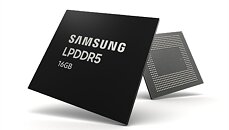Tuesday, February 25th 2020

Samsung Begins Mass Production of Industry's First 16GB LPDDR5 DRAM
Samsung Electronics, a world leader in advanced memory technology, today announced that it has begun mass producing the industry's first 16-gigabyte (GB) LPDDR5 mobile DRAM package for next-generation premium smartphones. Following mass production of the industry-first 12 GB LPDDR5 in July, 2019, the new 16 GB advancement will lead the premium mobile memory market with added capacity that enables enhanced 5G and AI features including graphic-rich gaming and smart photography.
"Samsung has been committed to bringing memory technologies to the cutting edge in allowing consumers to enjoy amazing experiences through their mobile devices. We are excited to stay true to that commitment with our new, top-of-the-line mobile solution for global device manufacturers," said Cheol Choi, senior vice president of memory sales & marketing, Samsung Electronics. "With the introduction of a new product lineup based on our next-generation process technology later this year, Samsung will be able to fully address future memory demands from global customers."Data transfer rate for the 16 GB LPDDR5 comes in at 5,500 megabits per second (Mb/s), approximately 1.3 times faster than the previous mobile memory (LPDDR4X, 4266 Mb/s). Compared to an 8 GB LPDDR4X package, the new mobile DRAM delivers more than 20-percent energy savings while providing up to twice the capacity.
Samsung's 16 GB LPDDR5 mobile DRAM package consists of eight 12-gigabit (Gb) chips and four 8Gb chips, equipping premium smartphones with twice the DRAM capacity found in many higher-end laptops and gaming PCs today. Along with the blazing-fast performance, the industry's largest capacity supports dynamic and responsive game play as well as ultra-high-resolution graphics on premium smartphones for highly immersive mobile gaming experiences.
As Samsung continues to expand LPDDR5 mobile DRAM production at its Pyeongtaek site, the company plans to mass-produce 16Gb LPDDR5 products based on third-generation 10 nm-class (1z) process technology in the second half of this year, in line with the development of a 6,400 Mb/s chipset. Such relentless innovation is expected to well-position Samsung to further solidify its competitive edge in markets such as premium mobile devices, high-end PCs and automotive applications.
"Samsung has been committed to bringing memory technologies to the cutting edge in allowing consumers to enjoy amazing experiences through their mobile devices. We are excited to stay true to that commitment with our new, top-of-the-line mobile solution for global device manufacturers," said Cheol Choi, senior vice president of memory sales & marketing, Samsung Electronics. "With the introduction of a new product lineup based on our next-generation process technology later this year, Samsung will be able to fully address future memory demands from global customers."Data transfer rate for the 16 GB LPDDR5 comes in at 5,500 megabits per second (Mb/s), approximately 1.3 times faster than the previous mobile memory (LPDDR4X, 4266 Mb/s). Compared to an 8 GB LPDDR4X package, the new mobile DRAM delivers more than 20-percent energy savings while providing up to twice the capacity.
Samsung's 16 GB LPDDR5 mobile DRAM package consists of eight 12-gigabit (Gb) chips and four 8Gb chips, equipping premium smartphones with twice the DRAM capacity found in many higher-end laptops and gaming PCs today. Along with the blazing-fast performance, the industry's largest capacity supports dynamic and responsive game play as well as ultra-high-resolution graphics on premium smartphones for highly immersive mobile gaming experiences.
As Samsung continues to expand LPDDR5 mobile DRAM production at its Pyeongtaek site, the company plans to mass-produce 16Gb LPDDR5 products based on third-generation 10 nm-class (1z) process technology in the second half of this year, in line with the development of a 6,400 Mb/s chipset. Such relentless innovation is expected to well-position Samsung to further solidify its competitive edge in markets such as premium mobile devices, high-end PCs and automotive applications.

20 Comments on Samsung Begins Mass Production of Industry's First 16GB LPDDR5 DRAM
Putting this much memory in even flagship smartphones means that for the vast majority of users something like half of it will be entirely wasted, never actually being utilized. 6-8GB? Sure, that can be made use of, particularly given the poor state of Android RAM management. But 16? Not a chance.
Phones should definitely be designed to last 5+ years, including making them easily serviceable and making spare parts broadly available. But again, boosting on-paper specs with limited real-world use is not how to do this.
Also, the Gates quote is rather specific in saying that "X is as much as anyone will ever need", while I said "no smartphone needs...". The use of the present tense there was intentional, which should be obvious. Your simile is as such invalid.
EDIT: (Adding more to the discussion)The reason for the more recent (2015+) increase in RAM for Android devices is mostly because of the multi-tasking feature introduced with Android 6. Memory would've been managed better if the majority of apps were still built on ART (from the inefficient Dalvik), but now that RAM is more abundant(???) they went back to a JIT-compiler back in 2017. Android can kinda still run AOT stuff, but it can tend to hamper the OS because now it would have to prioritize the app over the other OS-functions. This can seem inefficient when compared to iOS, but because each OS-function (the VM, JIT-compiler, garbage collector, etc.) is compartmentalized, more memory = better performance.
As for "supported by XDA" - that depends on there being a big enough community of skilled coders using the phone to actually make a working OS for it. And do these OSes receive updates that don't force you to wipe your phone? I'm hoping that has changed since I last dabbled in ROMs, but I wouldn't be surprised if it hadn't.Sadly, the only homework that can result in this is deciding to buy an iPhone. No Android phone has that kind of support.Given that I'm in Norway, US phone availability doesn't affect me much. As for phones with battery capacities like that, they're relatively rare, especially in the flagship space. Flagships tend to burn power like there's no tomorrow (logical, given that they have the most powerful SoCs) and thus wear out their batteries relatively quickly....where's the real-world benefit of keeping a bunch of stuff in RAM when it's not being actively used? Sure, if you're jumping between a game and 3-4 applications (let's say messaging, a browser and a music player, which isn't unrealistic even if it's a (very) edge use case) you'd still struggle to use 16GB of RAM unless said applications are terrible memory hogs (in which case the solution would be writing a better app, not getting more RAM). And if you aren't, you're just wasting power on keeping stuff in memory when it should be shuffled off to non-volatile memory. Which should be fast enough (and combined with a fast enough SoC) that launching the app should be near-instantaneous anyhow. Your argument has but the most tenuous relation to actual reality. It sounds logical in theory, but in practice it's full of holes.
I cannot agree with Apple's (previously) forced limitation on reducing performance due to battery life expectancy. That is planned obsolescence. They should've marketed to users that they have an option to throttle the SoC to save more battery life instead of forcing it on.
As for the former, I get that this is just a different approach, but it's still done rather poorly when relatively simple and feature-poor phone apps use as much memory as their much more fully featured desktop variants. And Windows does a lot of clever stuff by using "unused" RAM, but that doesn't mean you get a performance increase by moving from 16 to 32GB of RAM (or heck, even 8 to 16) if your workload doesn't send you above 80-90% RAM utilization. There might be some performance increase, but it's small enough not to actually matter, so upgrading hardware based on it is a poor choice.
Samsung Android 10 Device ListYes & that's why I said it depends on the device, to counter that you're adding another caveat? If you're gonna continue doing "what if" might as well write your own summary of why Android is <insert your feelings> or why phones don't "need" 16 GB memory. Why bother having counterpoints when you're constantly shifting goalposts?Ok, if you say so.Given that I'm in India, the second largest phone market outside China, I know they aren't as rare as you're making them out to be.
As for your second point, that also depends on what people are using them for. The flagship SoC are also generally the most efficient, and if you know how phone (or laptops) work your screen & network will drain/kill your battery way before just the SoC will.Full of holes ~ oh really? What you're basically saying is that Chome doesn't "need" 16GB of RAM, I mean what sort of a logic is this o_O
It clearly depends on the user & if you think reloading tabs (notwithstanding the ads or poorly written websites) is also not a major issue, well good luck with whatever direction you're trying to pull this into!
As someone pointed out before, this is more future proofing and the workloads will be more intensive in 4 years time. Plus the extra RAM is useful for emulators in my case or having my most common used apps at the ready.
You don't have to buy a 16GB RAM phone if you think it's a waste...
My boat has 3 Lithium-ion LiFePO4, Lithium-ion iron phosphate. The capacity is much less than used in phones, but I dont run the risk of a thermal run away problems.
For 16GB of RAM on phones to be anything more than yet another megapixel race-like spec sheet gimmick, they would need an OS and software ecosystem capable of doing actual work, including simultaneous multitasking on a large(r) screen (otherwise you could load the app from a flash-based page file in the time it takes the app switch animation to finish) and actual heavy software. Yes, sure, you can open a bajillion tabs in your phone browser, but is that in any way practical? Can you actually use them, and switch between them in a useful way? No; the physical interface of the phone becomes the limitation then. And with smart app development and fast storage there's no reason to keep the entire app in memory unless it's actually needed, so for background tasks you could easily shuffle off unnecessary/idle parts of the application (such as anything UI-related) to a page file.